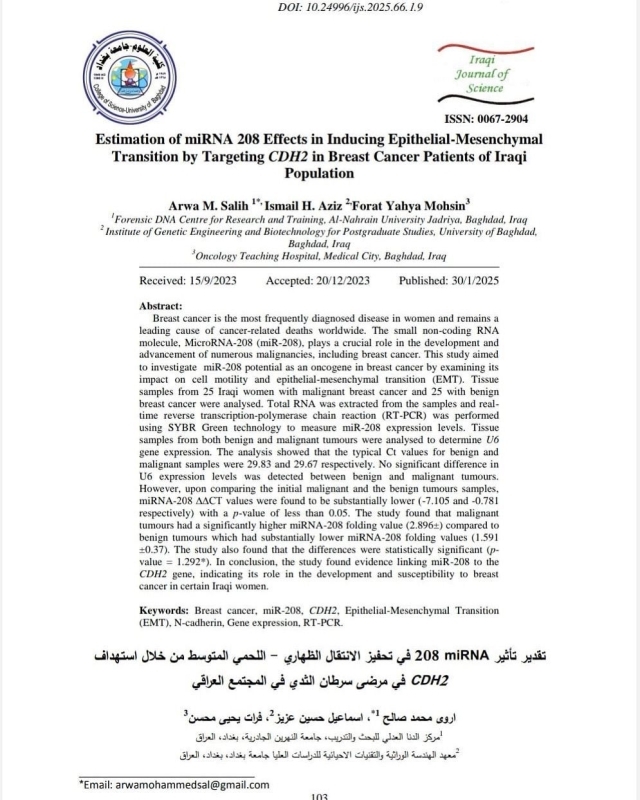
نشرت التدريسية أروى محمد صالح من المعهد العالي للعلوم العدلية في جامعة النهرين دراسة علمية حديثة في مجلة Iraqi Journal of Science، تناولت دور الجزيء (miR-802) في تحفيز الانتقال الظهاري-اللحمي المتوسط (EMT) في سرطان الثدي، من خلال استهدافه لجين (CDH2)، مما يجعله مرشحًا ليكون علامة بيولوجية للكشف عن المرض وتطوره.
أُجريت الدراسة على 50 عينة نسيجية مأخوذة من نساء عراقيات، حيث كان نصف العينات من مصابات بسرطان الثدي الخبيث، والنصف الآخر من مصابات بأورام حميدة. وأظهرت النتائج، باستخدام تقنية (qRT-PCR)، ارتفاعًا ملحوظًا في مستويات (miR-802) لدى المصابات بالأورام الخبيثة مقارنة بالمصابات بالأورام الحميدة، مما يشير إلى دوره المحتمل في تطور المرض.
وخلصت الدراسة إلى أن هذه النتائج تعزز الفهم العلمي لآليات تطور سرطان الثدي، وتفتح المجال لاستخدام (miR-802) كأداة تشخيصية وعلاجية مستقبلية. كما أوصى الباحثون بإجراء دراسات موسعة للتحقق من صحة هذه النتائج وإمكانية تطبيقها سريريًا، مما قد يسهم في تحسين استراتيجيات التشخيص والعلاج لمرضى سرطان الثدي في العراق والعالم.
قسم الإعلام والاتصال الحكومي
رئاسة جامعة النهرين
A Study at Al-Nahrain University Reveals the Role of (miR-802) in Breast Cancer Progression
Arwa Mohammed Saleh, a faculty member at the Higher Institute of Forensic Sciences at Al-Nahrain University, has published a recent scientific study in the Iraqi Journal of Science. The study examines the role of (miR-802) in promoting epithelial-mesenchymal transition (EMT) in breast cancer by targeting the (CDH2) gene, making it a potential biomarker for disease detection and progression.
The research was conducted on 50 tissue samples from Iraqi women, with half of the samples obtained from patients with malignant breast cancer and the other half from patients with benign tumors. The results, obtained using qRT-PCR technology, revealed a significant increase in (miR-802) levels in patients with malignant tumors compared to those with benign tumors, suggesting its potential role in disease progression.
The study concluded that these findings enhance the scientific understanding of breast cancer development mechanisms and suggest the potential use of (miR-802) as a diagnostic and therapeutic tool in the future. The researchers recommended conducting further extensive studies to validate these results and explore their clinical applications, which could contribute to improving diagnostic and treatment strategies for breast cancer patients in Iraq and worldwide.
Department of Media and Government Communication
Presidency of Al-Nahrain University
